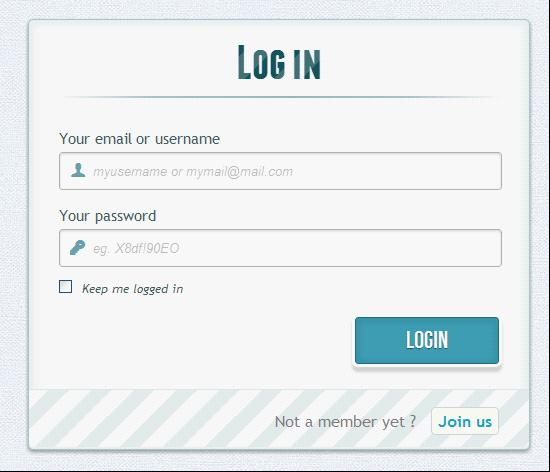| 导读:有开发者表示,HTML5将给个人开发者带来更多机遇。下面的稿件详细描述了一个唯美的动画效果,它实现了在同一个页面中进行登录表单和注册表单的转换。这些效果,完全由HTML5和CSS3实现。文章后面附上了三种不同风格的显示转换效果、以及源码下载。既可为网页瘦身,又可实现漂亮的网页效果,快快收藏吧。
这篇稿件将描述如何在HTML5中,使用CSS3的目标伪类“:target”来创建注册和登录两个表单、并实现它们在同一个页面中的显示转换。此演示目的是向用户展示从登录表单点击标注有“Join
us”的按钮链接到注册表单的动画效果。我们将在文章末尾附上本实例的源码下载地址。

点击右下方Join us按钮,登录表单隐藏,注册表单显现
请注意,此实例只用于演示目的,它只能在支持“:target”伪类的浏览器中正常显示出来。
HTML部分
在HTML中定义有两个表单,其中一个表单已用CSS隐藏使之不可见。来看看代码:
|
<div id="container_demo" >
<!-- hidden anchor to stop jump
http://www.css3create.com/Astuce-Empecher-le-scroll-avec-l-utilisation-de-target#wrap4 -->
<a class="hiddenanchor" id="toregister"></a>
<a class="hiddenanchor" id="tologin"></a>
<div id="wrapper">
<div id="login" class="animate form">
<form action="mysuperscript.php" autocomplete="on">
<h1>Log in</h1>
<p>
<label for="username" class="uname" data-icon="u" > Your email or username </label>
<input id="username" name="username" required="required" type="text"
placeholder="myusername or mymail@mail.com"/>
</p>
<p>
<label for="password" class="youpasswd" data-icon="p"> Your password </label>
<input id="password" name="password" required="required"
type="password" placeholder="eg. X8df!90EO" />
</p>
<p class="keeplogin">
<input type="checkbox" name="loginkeeping" id="loginkeeping" value="loginkeeping" />
<label for="loginkeeping">Keep me logged in</label>
</p>
<p class="login button">
<input type="submit" value="Login" />
</p>
<p class="change_link">
Not a member yet ?
<a href="#toregister" class="to_register">Join us</a>
</p>
</form>
</div>
<div id="register" class="animate form">
<form action="mysuperscript.php" autocomplete="on">
<h1> Sign up </h1>
<p>
<label for="usernamesignup" class="uname" data-icon="u">Your username</label>
<input id="usernamesignup" name="usernamesignup" required="required"
type="text" placeholder="mysuperusername690" />
</p>
<p>
<label for="emailsignup" class="youmail" data-icon="e" > Your email</label>
<input id="emailsignup" name="emailsignup" required="required"
type="email" placeholder="mysupermail@mail.com"/>
</p>
<p>
<label for="passwordsignup" class="youpasswd" data-icon="p">Your password </label>
<input id="passwordsignup" name="passwordsignup" required="required"
type="password" placeholder="eg. X8df!90EO"/>
</p>
<p>
<label for="passwordsignup_confirm" class="youpasswd" data-icon="p">
Please confirm your password </label>
<input id="passwordsignup_confirm" name="passwordsignup_confirm" required="required"
type="password" placeholder="eg. X8df!90EO"/>
</p>
<p class="signin button">
<input type="submit" value="Sign up"/>
</p>
<p class="change_link">
Already a member ?
<a href="#tologin" class="to_register"> Go and log in </a>
</p>
</form>
</div>
</div>
</div> |
可以看到在上面的代码中,使用了一些HTML5不错的新功能。比如在input
type方面,实现密码自动隐藏用户键入点替换(当然这取决于浏览器是否支持)。用浏览器检查输入类型的电子邮件是否是正确格式等。
有两个环节要记住。你可能已经注意到表单项部的两个<a href>链接。当我们点击并触发目标伪类时,我们就能通过“锚”标记(HTML中一种跳转定位方式,一般用于长网页)在原网页中跳到合适的位置,而不用另打开一个新网页。第二个动作与所用图标、字体相关。我们为显示的图标使用一个数据属性。在HTML中通过设置“icon_character”,就可以选择一个CSS来控制所有的图标风格样式。(这里对于锚标记的使用可能会有些糊涂,但看到后面就会明白了。)
CSS部分
这里将会出现一些CSS3的技巧代码,请注意,可能有的浏览器目前还不支持CSS3而无法正常显示。
两个CSS定义。(后面会说明为什么要定义两个CSS的原因。)
首先,为需要显示的区域定义一个外观。
|
#subscribe,
#login{
position: absolute;
top: 0px;
width: 88%;
padding: 18px 6% 60px 6%;
margin: 0 0 35px 0;
background: rgb(247, 247, 247);
border: 1px solid rgba(147, 184, 189,0.8);
box-shadow:
0pt 2px 5px rgba(105, 108, 109, 0.7),
0px 0px 8px 5px rgba(208, 223, 226, 0.4) inset;
border-radius: 5px;
}
#login{
z-index: 22;
} |
这里定义了投影,以及如文章开始的那张图上所示的蓝色辉光。并赋值z-index为22。
下面是关于背景图片样式的代码:
|
/**** general text styling ****/
#wrapper h1{
font-size: 48px;
color: rgb(6, 106, 117);
padding: 2px 0 10px 0;
font-family: 'FranchiseRegular','Arial Narrow',Arial,sans-serif;
font-weight: bold;
text-align: center;
padding-bottom: 30px;
}
/** For the moment only webkit supports the background-clip:text; */
#wrapper h1{
background:
-webkit-repeating-linear-gradient(-45deg,
rgb(18, 83, 93) ,
rgb(18, 83, 93) 20px,
rgb(64, 111, 118) 20px,
rgb(64, 111, 118) 40px,
rgb(18, 83, 93) 40px);
-webkit-text-fill-color: transparent;
-webkit-background-clip: text;
}
#wrapper h1:after{
content:' ';
display:block;
width:100%;
height:2px;
margin-top:10px;
background:
linear-gradient(left,
rgba(147,184,189,0) 0%,
rgba(147,184,189,0.8) 20%,
rgba(147,184,189,1) 53%,
rgba(147,184,189,0.8) 79%,
rgba(147,184,189,0) 100%);
} |
注意,由于目前只有WebKit浏览器支持background-clip: text,为了在适应不同浏览器,还要创建一个H1标题样式:带条纹背景的文本样式。由于background-clip:
text只适用于WebKit,所以这里用WebKit作前缀,这也是为什么要把CSS分成两部分,并只使用来定义的原因。用WebKit作前缀是不太好的做法,仅用于这种演示示例。现在,WebKit的文本颜色透明度属性可以派上用场了:它可以实现透明效果的背景样式。
表单上,标题下方那条水平线的样式也由一个after伪类控制。这里使用了一个2px的高度和两边淡出的效果。
现在,接着进行样式定义。
|
/**** advanced input styling ****/
/* placeholder */
::-webkit-input-placeholder {
color: rgb(190, 188, 188);
font-style: italic;
}
input:-moz-placeholder,
textarea:-moz-placeholder{
color: rgb(190, 188, 188);
font-style: italic;
}
input {
outline: none;
} |
为输入样式定义outline属性,以便用户能迅速输入正确信息。如果你不打算定义outline,那也应该使用
:active 和 :focus来定义这些输入样式的状态。
|
/* all the input except submit and checkbox */
#wrapper input:not([type="checkbox"]){
width: 92%;
margin-top: 4px;
padding: 10px 5px 10px 32px;
border: 1px solid rgb(178, 178, 178);
box-sizing : content-box;
border-radius: 3px;
box-shadow: 0px 1px 4px 0px rgba(168, 168, 168, 0.6) inset;
transition: all 0.2s linear;
}
#wrapper input:not([type="checkbox"]):active,
#wrapper input:not([type="checkbox"]):focus{
border: 1px solid rgba(91, 90, 90, 0.7);
background: rgba(238, 236, 240, 0.2);
box-shadow: 0px 1px 4px 0px rgba(168, 168, 168, 0.9) inset;
} |
这里我们并不全是用伪类去定义输入样式,除了checkbox。因为删除了outline属性,所以这里使用了
a :focus 和:active 状态定义。自从不再为输入样式使用:before 和 :after伪类后,就使用图标的label标签进行设置。这里使用了fontomas库中的一些漂亮图标。还记得data-icon
的属性吗?要把信息传递到正确的地方。这里使用data-icon=’u’ 来表示用户, ‘e’ 表示email,
‘p’ 表示密码。一旦确定的信件,下载字体,用fontsquirrel字体引擎将这些信息转换成@font-face兼容格式。
|
@font-face {
font-family: 'FontomasCustomRegular';
src: url('fonts/fontomas-webfont.eot');
src: url('fonts/fontomas-webfont.eot?#iefix') format('embedded-opentype'),
url('fonts/fontomas-webfont.woff') format('woff'),
url('fonts/fontomas-webfont.ttf') format('truetype'),
url('fonts/fontomas-webfont.svg#FontomasCustomRegular') format('svg');
font-weight: normal;
font-style: normal;
}
/** the magic icon trick ! **/
[data-icon]:after {
content: attr(data-icon);
font-family: 'FontomasCustomRegular';
color: rgb(106, 159, 171);
position: absolute;
left: 10px;
top: 35px;
width: 30px;
} |
不用为每个图标指定一个类,而是使用content: attr(data-icon) 来检查data-icon属性信息。所以只需要定义字体、颜色和位置。
现在,为两个表单中的提交按钮定义样式。
|
/*styling both submit buttons */
#wrapper p.button input{
width: 30%;
cursor: pointer;
background: rgb(61, 157, 179);
padding: 8px 5px;
font-family: 'BebasNeueRegular','Arial Narrow',Arial,sans-serif;
color: #fff;
font-size: 24px;
border: 1px solid rgb(28, 108, 122);
margin-bottom: 10px;
text-shadow: 0 1px 1px rgba(0, 0, 0, 0.5);
border-radius: 3px;
box-shadow:
0px 1px 6px 4px rgba(0, 0, 0, 0.07) inset,
0px 0px 0px 3px rgb(254, 254, 254),
0px 5px 3px 3px rgb(210, 210, 210);
transition: all 0.2s linear;
}
#wrapper p.button input:hover{
background: rgb(74, 179, 198);
}
#wrapper p.button input:active,
#wrapper p.button input:focus{
background: rgb(40, 137, 154);
position: relative;
top: 1px;
border: 1px solid rgb(12, 76, 87);
box-shadow: 0px 1px 6px 4px rgba(0, 0, 0, 0.2) inset;
}
p.login.button,
p.signin.button{
text-align: right;
margin: 5px 0;
} |
这里是一个创建边框投影的技巧,你可以随意设置一条或多条边框投影。这里使用length value来创建一个“假”的第二条边框,宽度为3px,无模糊效果。接着定义复选框的样式:
|
/* styling the checkbox "keep me logged in"*/
.keeplogin{
margin-top: -5px;
}
.keeplogin input,
.keeplogin label{
display: inline-block;
font-size: 12px;
font-style: italic;
}
.keeplogin input#loginkeeping{
margin-right: 5px;
}
.keeplogin label{
width: 80%;
} |
为表单使用重复线性渐变的样式,以实现条纹背景效果。
|
p.change_link{
position: absolute;
color: rgb(127, 124, 124);
left: 0px;
height: 20px;
width: 440px;
padding: 17px 30px 20px 30px;
font-size: 16px ;
text-align: right;
border-top: 1px solid rgb(219, 229, 232);
border-radius: 0 0 5px 5px;
background: rgb(225, 234, 235);
background: repeating-linear-gradient(-45deg,
rgb(247, 247, 247) ,
rgb(247, 247, 247) 15px,
rgb(225, 234, 235) 15px,
rgb(225, 234, 235) 30px,
rgb(247, 247, 247) 30px
);
}
#wrapper p.change_link a {
display: inline-block;
font-weight: bold;
background: rgb(247, 248, 241);
padding: 2px 6px;
color: rgb(29, 162, 193);
margin-left: 10px;
text-decoration: none;
border-radius: 4px;
border: 1px solid rgb(203, 213, 214);
transition: all 0.4s linear;
}
#wrapper p.change_link a:hover {
color: rgb(57, 191, 215);
background: rgb(247, 247, 247);
border: 1px solid rgb(74, 179, 198);
}
#wrapper p.change_link a:active{
position: relative;
top: 1px;
} |
现在,我们已经定义了两个漂亮的样式了,但在一个时间段里,只需要显示一个。所以,现在用动画效果来实现。
创建切换动画
首先是将不透明度设为0以隐藏表单:
|
#register{
z-index: 21;
opacity: 0;
} |
还记得吗?前面登录表单中z-index的值为22。上面这段代码的动作是把z-index的值定义为21,让它可以处在登录表单的上一层(指显示顺序,数字小的显示在前面)。
重点部分:target目标伪类。这里将使用“锚”进行两个表单间的显示过渡。“锚”链接的一般用法,是在页面上的两处实现跳转。但这里并不希望跳转到别处,只需要表单显示的切换。这里的诀窍在于表单顶部的两个小环节中,当点击“锚”标记时,触发第一个表单的显示设置“none”。这样,就避免了任何的页面跳转。
|
#toregister:target ~ #wrapper #register,
#tologin:target ~ #wrapper #login{
z-index: 22;
animation-name: fadeInLeft;
animation-delay: .1s;
} |
当点击登录表单上的“Join us”按钮时,就会触发 #toregister,然后通过选择找到#register,激活动画fadeInLeft。使隐藏的表单慢慢显现出来,并同时改变其z-index值,让这个表单出现在其它表单的上面。
下面是实现这种动画样式的代码。
|
.animate{
animation-duration: 0.5s;
animation-timing-function: ease;
animation-fill-mode: both;
}
@keyframes fadeInLeft {
0% {
opacity: 0;
transform: translateX(-20px);
}
100% {
opacity: 1;
transform: translateX(0);
}
} |
表单用“disappearing”的动画形式从左边淡出:
|
#toregister:target ~ #wrapper #login,
#tologin:target ~ #wrapper #register{
animation-name: fadeOutLeftBig;
}
@keyframes fadeOutLeft {
0% {
opacity: 1;
transform: translateX(0);
}
100% {
opacity: 0;
transform: translateX(-20px);
}
} |
上面的动画实现代码来自Dan Eden的 animate.css,把其中的动画名称修改为自己的表单对象就可以实现。里面还有一些其他的自定义动画。
(需要注意的是,有些浏览器还不支持background-clip: text。IE9中,过渡和动画效果就无法显示,IE8及更低版本的浏览器还不支持CSS3中的伪类。)
|


